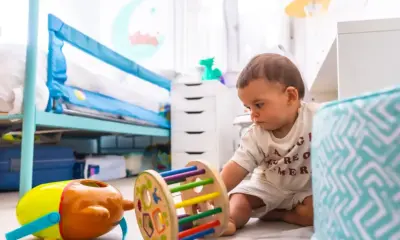Studies
Babies May Not Recall Infancy, But They Do Create Memories

How Babies Create Early Memories and Shape Their Future
Recent research shows that babies are capable of creating memories as early as 1 year old, challenging past beliefs.
Previously, scientists believed that babies’ brains were too immature to form lasting memories. However, new findings suggest otherwise. Babies create early memories that influence their development in ways we are only beginning to understand.
Breaking Down Infantile Amnesia: The Key to Early Memory Creation
For years, researchers believed that infantile amnesia prevented babies from recalling their first few years. However, a recent study challenges this idea.
The hippocampus, a part of the brain responsible for memory, matures over time. Experts initially thought this meant babies couldn’t form memories. Yet, the new study discovered that babies create early memories using this very part of the brain.
Dr. Tristan S. Yates, a key researcher in the study, explains that babies’ ability to form memories may be linked to their brain’s developmental stages. The researchers used advanced brain scanning methods to observe how babies respond to images.
How Scientists Discovered Babies Can Form Memories
In the study, scientists used fMRI technology to measure brain activity while babies were shown various pictures. The researchers found that when babies recognized images they had seen before, their hippocampus showed more activity.
This groundbreaking research highlights that babies create early memories which may explain why infants show strong emotional responses to familiar people and objects. The study suggests that the memories babies form could remain in their minds, even if we cannot remember them later.
Using fMRI to Study Baby Brain Activity
Dr. Yates and his team developed a new method to perform fMRI scans on awake infants. They showed babies images of faces, toys, and outdoor scenes, then tested their reactions to the same images. Babies who looked longer at the familiar image showed greater hippocampal activity.
The findings support the idea that babies can form memories, which may impact their social, emotional, and cognitive growth.
The Importance of Early Memories for Baby Development
Experts believe that babies create early memories that are crucial for their emotional and psychological development. Memories form the foundation of learning, attachment, and social interactions as babies grow.
Marilyn Cross Coleman, an expert in perinatal mental health, explains that early memories help babies build emotional connections and understand their world. Babies’ early memories help them perceive the world as either safe or unsafe, affecting their social behavior and relationships.
Emotional and Social Development Through Early Memories
These memories guide babies in forming attachments to caregivers, which in turn influences their future relationships. Dr. Coleman explains that a baby’s early experiences with their caregivers create the foundation for their ability to maintain healthy relationships as adults.
The emotional understanding babies develop from these early memories helps them feel secure, knowing that their needs will be met. This understanding sets the stage for healthy social interactions later in life.
Real-Life Impact: What Parents Can Do to Encourage Healthy Memory Formation
Babies’ early memories may not be conscious, but they still influence their behavior and emotional well-being. Parents play a crucial role in fostering a baby’s ability to form positive memories.
Talking, singing, and physical affection are essential in creating secure attachments, according to Dr. Sanam Hafeez, a neuropsychologist. These interactions help build a baby’s memory framework, leading to better emotional development.
The Role of Parents in Supporting Memory Formation
Parents can significantly influence how their baby’s memories develop by providing a nurturing and responsive environment. By creating routines and responding promptly to needs, parents help establish feelings of safety and trust.
Dr. Coleman emphasizes that even though babies don’t consciously remember specific events, their brains remember emotional experiences. These memories shape their future emotional responses and interactions with the world around them.
Building Routine and Stability
Routines, like consistent bedtime rituals, provide babies with a sense of security. Babies learn that their needs will be met, and they develop trust in their caregivers. This stability also helps babies feel safe in their environment.
Dr. Yates further highlights the importance of these early memories, stating, “Even though many specific memories don’t last into adulthood, they lay the groundwork for a person’s future.”
Conclusion: The Impact of Early Memories on Lifelong Development
Babies create early memories that lay the foundation for their emotional and social development. These early experiences shape their ability to trust, form relationships, and interact with others.
Parents can support this process by providing a loving and responsive environment, fostering secure attachments, and creating stable routines. Even though babies may not remember the exact moments, these memories impact their emotional health.
Want to learn more about child development and parenting tips? Explore more news on this website and stay informed on the latest research.












